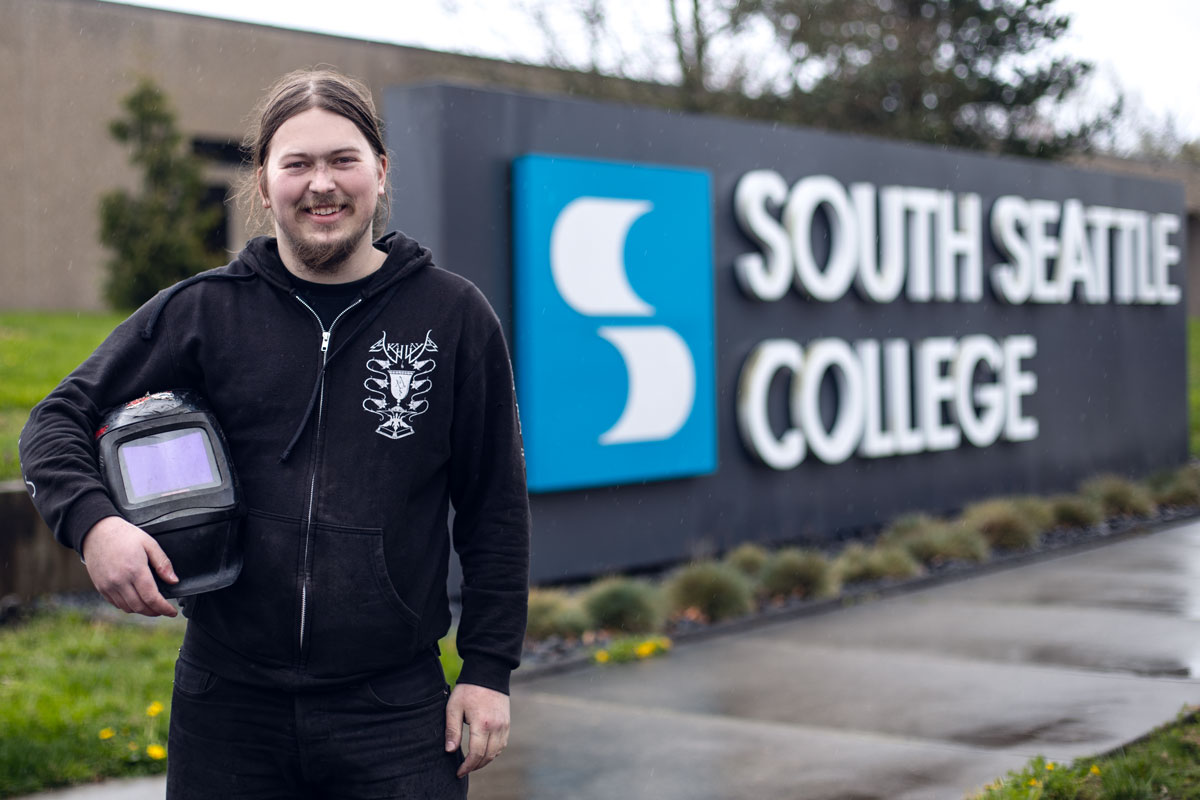Floyd Sagor
“A promise I made myself is to find a career I would enjoy.”
Seattle Promise Alumnus
Welding Fabrication Technology A.A.S. Graduate, South Seattle College
2022 Nova High School Graduate
ABOUT FLOYD
The structure and discipline of college was exactly what Floyd Sagor needed all along. When Seattle Promise’s outreach staff visited his high school, Sagor was the first to admit that he wasn’t the best student at the time, and it wasn’t an environment that worked for him since deadlines were more malleable and showing up to school late had less consequences. But with the promise of two years of tuition-free education, there was no risk for him to try studying under South Seattle College’s welding program.
Sagor approached college the same way he did high school, which led to missing his first-ever welding class by arriving late to campus. He also wasn’t performing well in Math early in his first quarter. He realized he had to take greater ownership of his studies, because no one was handholding him through a routine in college.
Through hard work at installing structure to his educational life, Sagor started excelling consistently in class for the first time and found his passion in welding and its different techniques. He also cited the support network he had at South Seattle College, particularly with Doug Rupik, professor of welding, for his success. Sagor currently works at the Alaska Copper & Brass Company, primarily TIG welding stainless steel, copper and nickel piping.

IN THEIR WORDS
On adding a routine, structure and discipline to their life:
“By the end of high school, I needed more structure. Once I was in college, it was this rigorous, fast-paced thing I never had before. There was a list of things to get done today, this week and this month; there were deadlines and those deadlines mattered. I had to wake up at 5:00 a.m. because I took three buses to school and I never had to wake up that early for anything [before].”
“My job starts at 6:30. I would’ve been laid off pretty quick without having that routine built in. Being used to that and being able to get up early and function was useful. I think it was nice.”
On newfound success in an academic setting:
“I’d get into this math class and after the first week I look at my grade and I have a D. I realized, ‘oh, I actually need to do the work.’ I studied really hard and by the end of the quarter I had a 95 and I was really proud of that. I always thought I was kind of ‘meh’ in Math, so that was very emboldening for me.”
On Seattle Promise’s draw:
“The really big thing is it allows you to take a risk that you can't take otherwise. If you're looking at a program and you're like, ‘well, I don't really know if I want to do it, and it's going to be five or ten grand and it's going to be this big chunk of money. And what if I hate it, right? Why even bother?’”
“I think a lot of people see it that way. So being able to go, ‘well, even if I am terrible at it, it's just some time I've invested, and I haven't lost any money on it. It's all paid for, and they want me to do it, so I might as well give it a try.’ That's really important. I probably wouldn't have taken any programs if I hadn't had Seattle Promise.”
On Doug Rupik, welding faculty member:
“Doug is awesome. He’s a great teacher and probably the reason half of the people [in welding] graduate, especially Seattle Promise students. A lot people go into it kind of expecting to quit, and then they meet Doug. Everyone I’ve know who’s gone [to South] loved him. He’s pretty talented and a great welder. There's plenty of things he doesn’t know and he makes that known, and that’s one of the best things about him. If he’s not sure, we’ll go look it up on the code book. He’s a great teacher.”
On Seattle Promise’s impact to his career:
“Seattle Promise was the driving force behind me taking the welding program. The program really is designed for you to have a job before you even leave school. I didn’t have just one offer. I had several and I took the one that aligned closest to my interests.”
On the importance of trades:
“People need to be in the trades. Trades are kind of the backbone of any city. Membership has been declining, people don’t want to work in the trades, and white collar [work] is appealing. But that doesn’t work for everyone, and people need an in. That is a lot of the time going to be college.”
“I think the trades are important for Seattle's growth and especially upkeep. Just drive around downtown at night and you'll see a dozen trucks driving around, cleaning the street, repairing electrical poles—you name it. Everything needs to be maintained and repaired. A lot of work I do is just replacing old parts of piping systems.”